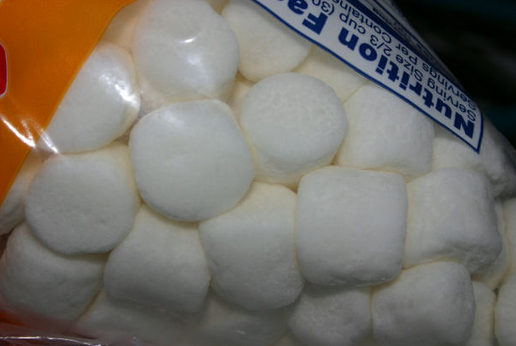Today’s question: can dogs eat marshmallows? Are marshmallows bad for dogs? Scroll down for detailed questions.
Dogs eat the strangest foods from time to time. We may associate dogs as being strictly meat eaters, but we all know dogs that love their candy and love their treats! Dogs may try and swipe as much food as possible, preferring to go for the meat, but dogs will also attempt to eat the sugary snacks and treats as well.
When it comes to candy, what is the one thing no one can resist? That sweet sin everyone longs for and loves eating no matter what time of the day it is or regardless of the fact that it could contain too much sugar? Well, the answer for that is marshmallow, of course! Marshmallows are gooey and flavorful, often reminding us of our childhoods. Marshmallows are a bit of a comfort food for most, and can be added into most anything to be enjoyed. Cookies, cakes, graham crackers and pie all can have marshmallow inside. Marshmallows are also eaten like popcorn, put on top of hot drinks, or used as topping for treats such as cereal and ice cream. No matter how much you love (or do not love) marshmallow, your dog will probably follow the majority and secretly pine for his/her share of the marshmallow stash on top of the counter.
We all love marshmallows and snack on them while watching a movie or roasting them on the bonfire, but can you share the fluffy goodness with your dog, for instance? Can dogs eat marshmallows or would it be better to leave them aside and focus on something else to feed them? The answer for most would be, setting aside the marshmallows and offering a healthier treat, or ignoring the begging of your dog completely. What fun is ignoring your dog or offering an uneventful vegetable when you can share marshmallows with your dog on a summer night? Should marshmallows be completely avoided by dogs, or are these treats harmless, but only on occasion?
Let’s find out!
Can Dogs Eat Marshmallows?
Marshmallows are not recommended as regular treats for your pooch. Once in a while is okay if you want to hide some medication in them.
Marshmallows seem to be the perfect treat for your pup, right? They have the ideal size, and shape, and they also taste great. Usually with human food, a dog will either turn up its nose at the smell or texture, or dislike the food that is being offered since his/her master left the veggie alone on his own plate first. Human food is also not meant for canine consumption due to risk of choking and a risk of toxins. Marshmallows are small and soft and would seem to slide down the throat of a dog relatively easily and perhaps melt before any choking risk presented itself. Marshmallows may seem like a safe treat to serve your dog, but can you give them to your dog without much risk?
Most of the dog owners will agree that if your marshmallows are fed to the dog, the serving is much like pumping the dog up with sugar, and not with vitamins and nutrients needed for proper development. Marshmallows do not have any vitamin or mineral components beneficial to dogs and have such a high rating of sugar, that any benefit to your dog is quickly negated.
Added sugar can cause multiple heath problems in dogs as well as tooth decay and gum disease. Humans are not the only creatures to develop health issues in relation to sugar and weight gain. Dogs are also at risk, perhaps even more so since dogs do not have the digestion ability and the logic that humans have in regards to food.
Feeding your dog marshmallows also promotes obesity. Marshmallows are not the best option for your pup to eat (even as a treat), but once again, moderation seems to be everything. Any type of food that is deemed non-toxic and not a choking hazard is technically safe to offer your pet, but be sure to only offer on very special occasional and in small amounts. One thing you should remember at all times is that you do not really want to make a habit out of feeding your dog sugary snacks or feeding your dog marshmallows on a daily basis in the long term. One marshmallow once in a while is fine. Dogs enjoy a smore without the chocolate just as we do, but leave the treat to once a season only. Adding marshmallow to his/her diet will only make things bad for you and your dog.
Marshmallows are not recommended to feed to dogs really for any reason other than human want to offer. However, marshmallows can be pretty useful when the dog is sick and needs his medication. Most of the dogs will have a hard time accepting medications and even refuse taking it. Dogs even have the insane ability to eat around a medication tablet and spit out the medicine while having licked the entire food bowl clean. The trick to having your dog swallow medicine is to know how to administrate the pill.
Marshmallows will step into the rescue when needing a medication aid. Simply wrap a pill in marshmallow, or stick a pill in the center of a marshmallow and watch your dog swallow the pill whole. You could be surprised, but using this treat as a health enhancing tool can be a great way to hide drugs inside a marshmallow. Your dog will gladly eat the sweet treat with the drug in it, and be none the wiser. The marshmallow will hide the look, feel, and taste of the capsule, while being easily able to move down the throat and be ingested without choking.
Giving your dog one or two pieces of marshmallows will definitely not hurt him/her. However, do not feed you’re a pooch bowl full of marshmallows. This will most likely make him/her sick. Moderation is the key here. Marshmallows will not kill your dog, but they will cause your dog to become sick and perhaps cause a mess. Marshmallows given often to your begging pal may also create a dog that refuses his/her dog kibble. Refusing dog food and holding out for the treats is a common offense by spoiled dogs, and an offense you should avoid at all costs. Dogs need their nourishment to be derived from proper food designed for their breed, not a diet based upon sugar, marshmallow, and the human food you offer.
What Happens If Your Dogs Has Eaten Too Many Marshmallows?
Sometimes, however, accidents do happen. Your dog may find a bag full of marshmallows and finish them all. If that happens, your pup is most likely going to experience some diarrhea and vomiting. This would be too much sugar to be eaten in one setting. Your pet’s body will not be able to process all of that sugar at once. A human body could not process that much sugar at once, let alone a dog. Dogs do not have the digestive makeup to tolerate the amount of sugar in a bag of marshmallows; however, there are not enough toxins in marshmallows to cause concern of poisoning. Be sure to verify with your vet that your dog will be safe if you have found an empty bag of marshmallows and a whimpering dog in the corner. Your vet will most likely advise you to keep your dog outside (for easy cleanup), rested, and hydrated until the sugar passes through the system.
Another side effect caused by the excessive amount of sugar is indigestion. Consider the fact that your dogs’ digestive system has not been created and prepared for such foods, so having indigestion seems like a natural effect. Dogs do not have the ability to take Tums or any other heartburn aid, so your dog may suffer from indigestion for a longer period of time that you do. Dogs should not suffer from human ailments such as heartburn,. But will on occasion if sugar is over indulged in. There are homeopathic remedies dogs are able to ingest to relieve indigestion, if you notice your dog is having difficulty remaining comfortable or feeling like him/herself. A vet may also advise you on natural methods to reduce your pup’s pain.
Too much sugar causes diabetes, heart disease, tense blood vessels, fatty liver, high cholesterol, the body not to feel full (feel hungry all the time), lack of energy, depression (the body releases less levels of feel-good dopamine), and unhealthy skin.
Unhealthy Treat
Marshmallows do not contain any natural substances. They are made of sugar, gelatin, corn starch, artificial flavors and colors. So, there is nothing nutritious and healthy about them. Even the sugar is artificial and processed. What is this supposed to mean for your dog?
It means that if your dog were out there, in the wild, it would probably not come across this sweet. Your dog’s body has been designed to eat meat; it comes as a natural conclusion that he would be unable to consume a lot of sugar. This is why it would be best for you to take it easy and not to give him excessive amounts of this treat.
Your dog can eat one or two marshmallows, but that’s it! It’s definitely not a healthy food for your dog. Instead, you should be focusing more on giving nutritious food to your pup. The food that has all the vitamins and nutrients your dog needs in order to grow healthy and happy.
Conclusion
In conclusion, whether you are giving the dog a treat or a meal, you should always focus on offering him something healthy to munch on. Forming a bad habit when it comes to your dog’s diet will catch up later on and bring along a series of unpleasant health complications.
Dogs can eat marshmallows though it is not recommended. If your pup looks at you with those big eyes asking for a piece, you can feed him one occasionally. Remember that marshmallows are filled with sugar and we all know what sugar does not only to your dog’s body but also to yours. So, pay a lot of attention and try to eat something else that is healthier and not something that almost completely is made of sugar.
Related articles:
References:
http://canigivemydog.com/marshmallows
http://moderndogmagazine.com/articles/do-s-and-dont-s-sharing-food-your-dog/17293









Leave a Comment